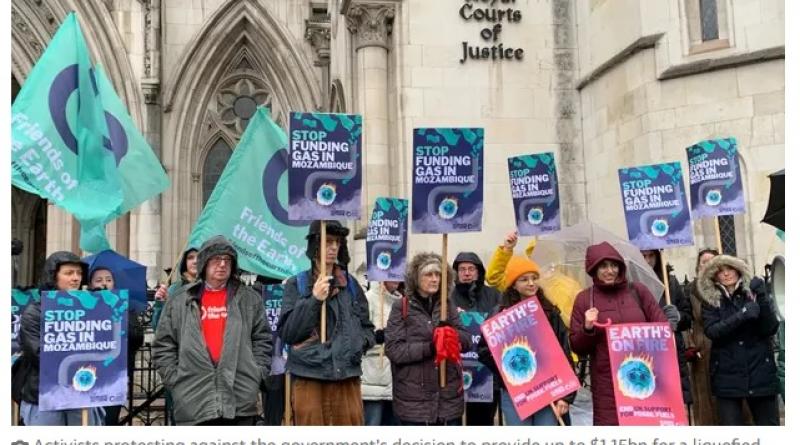The UK was “embarrassed” into funding a huge gas project in Mozambique while considering ending overseas support for fossil fuels, a court has heard.
During a three-day high court hearing, Friends of the Earth highlighted government documents that suggested there would be “obvious repercussions” if the government did not follow through on $1.15bn of support to an offshore pipeline and liquefied natural gas plant in Cabo Delgado province.
Representing the campaign group in a judicial review of the decision to fund the project, barrister Jessica Simor QC said rejection would have resulted in the need to unwind existing contracts and a perceived loss of trust in the UK’s “ability to execute transactions”.
The money – a combination of loans and guarantees – comes from the government’s export credit agency, UK Export Finance (UKEF). At an advanced point in the negotiations, UKEF “felt that not agreeing to the loan would be embarrassing to the United Kingdom given its role in the African Development Bank”, Simor told the court. The African Development Bank is co-financing the project, which is led by oil company Total.
UKEF approved the funding in July 2020, having concluded that the project could lead to a net reduction in global emissions and would help Mozambique meet its own climate targets.
But Friends of the Earth said the project’s climate assessment was inadequate. It is particularly critical of the fact that the assessment only considered how compatible it was with keeping the average global temperature rise to 2C, not the more stringent 1.5C that is now considered a vital physical threshold by scientists.
It also argues that, under the Paris agreement, the UK has a responsibility to help developing countries increase their capacity for renewable energy.
Mozambique is not only one of the poorest countries in the world, but also one of the most affected by the climate crisis and most vulnerable to its impacts.
It is also in the middle of a violentIslamic State-led insurgency. Environment minister Zac Goldsmith said earlier this year that “the prospect of the arrival of massive gas income” was one driver of the conflict and he hoped this would be the last fossil fuel project funded by UKEF.
Even as discussions about Mozambique were going on, the government was considering whether to pull the plug on all overseas fossil fuel funding. Documents cited in court suggest the civil service was concerned that to reject the Cabo Delgado project would “pre-empt” the government’s policy decision and affect wider UK support for the hydrocarbon sector.
The UK finally committed to ending support for overseas projects last December, five months after the Mozambique deal was finalised.
Parts of the government do appear to have been nervous about financing the project, which both the foreign and international development secretaries at the time, as well as the Cop secretariat, had recommended against.
UKEF, which has been accused by activists of “rank hypocrisy” over its record on fossil fuel financing, acknowledged that there were both environmental and reputational risks in providing funding.
But internal government documents cited in court also showed concern that rejecting it may encourage further campaigning against UKEF, including in other sectors such as aviation.
UKEF declined to comment on ongoing legal proceedings but said in a statement that it remains confident it follows “robust and internationally recognised due diligence before providing any support for overseas projects”.







